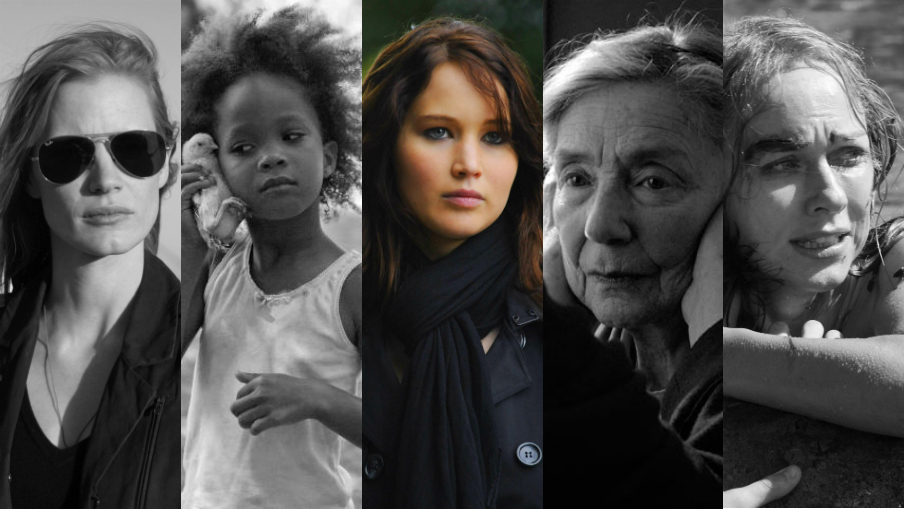A number of factors were in play that likely helped Lawrence win the Oscar for Best Actress. To start, Silver Linings Playbook was one of the most easily digestible, entertaining films of the 2012 Oscar season. It deals with an important subject (mental illness) in a relatable way, with a cast of likable stars like Lawrence, Bradley Cooper and Robert De Niro, and Lawrence’s performance as Tiffany Maxwell is the kind of scrappy, manic archetype that naturally stands out. On top of that, Lawrence was the lead of a little movie called The Hunger Games, frequently appeared on the cover of magazines, and went viral for her many “quirky” quotes and habits. How could Academy voters resist?
It has now been four years since Lawrence took home the Oscar for Silver Linings Playbook, at the tender age of 22. A few entertainment sites have ranked Lawrence’s win as one of the most undeserved Best Actress wins, while others still look back fondly on her victory. Let’s take a look back at the 2012 Oscar race for Best Actress to determine who should have won.
Quvenzhané Wallis – Beasts of the Southern Wild
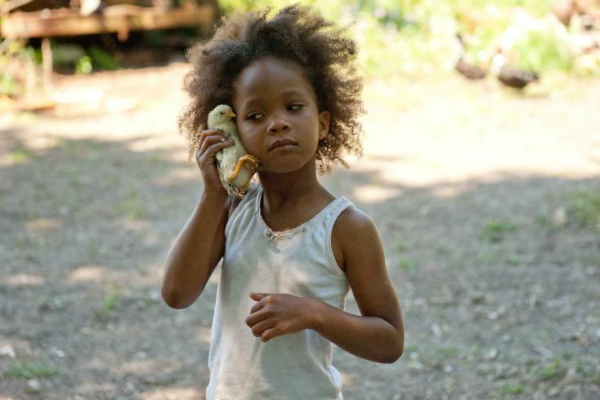
Wallis made Oscar history by being the youngest Best Actress nominee ever, at just nine years old. The authenticity of her performance as Hushpuppy in Beasts of the Southern Wild was enrapturing for Oscar voters, who also nominated the film for Best Picture, Best Director for Benh Zeitlin, and Best Adapted Screenplay for Zeitlin and Lucy Alibar. The love for such a small film as Beasts at the Oscars was considered a surprise at the time, despite awards attention from smaller critics groups. Wallis wasn’t even nominated at the Golden Globes, the SAG Awards or BAFTA, the three major precursors for the Oscars.
Young Wallis gives a strong-willed performance that largely carries Beasts, and in doing so, helps create strong narrative cohesion out of what is essentially a slice-of-life film about a Louisiana bayou. Her youth was also a major factor in what got her the nomination for Best Actress, but it also probably cost her the win. Academy voters tend to ignore kid performances when it comes to giving them trophies (the last one being The Piano‘s Anna Paquin in 1994 at age 13), so the nomination was the win for Wallis.
Naomi Watts – The Impossible
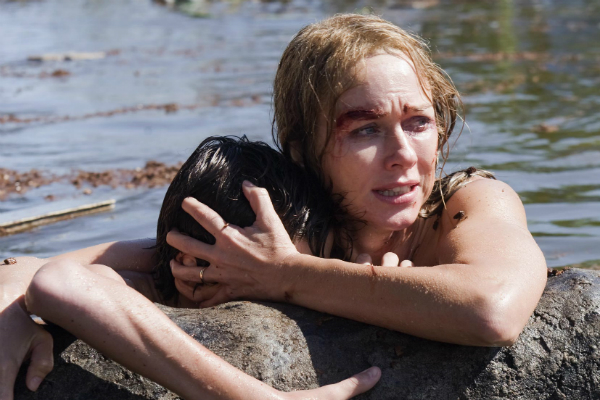
Naomi Watts was the only Oscar nomination for The Impossible, a disaster film about the aftermath of the 2004 tsunami in Southeast Asia. Watts gives an emotionally-wrenching performance as a young mother struggling to survive the devastating floods. It is almost a dialogue-free performance, mostly having to convey the emotional and physical trauma of her situation. This was Watts’ second Oscar nomination, following her performance as Cristina Peck in 2003’s 21 Grams.
Watts had a lot of support from her acting peers in Hollywood for her performance, and that helped her get nominations at the Globes, SAG, and finally the Oscars. As far as winning potential, I do wonder if the extremities of the role itself are what got her the nomination rather than her actual performance, and considering the other four actresses were in Best Picture nominees (i.e., more beloved films), there wasn’t a feasible path to victory for her.
Emmanuelle Riva – Amour
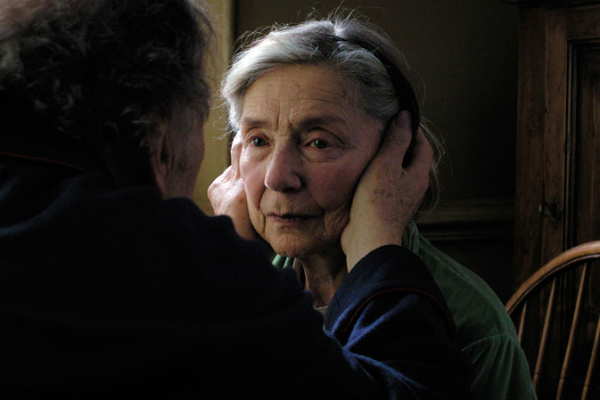
On top of the record set by Wallis, Emmanuelle Riva set a record as the oldest Best Actress nominee ever, at 85. The French actress also has some similarities with Watts in that much of her performance is physical and wordless, playing a stroke victim in Amour. It’s haunting, bleak, and incredibly difficult to watch, especially if you’ve gone through similar experiences of watching your loved one slip away. Riva’s performance feels so lived-in that you sometimes forget you’re watching a fictional character.
Riva’s nomination was a bold choice by the Academy, which so rarely goes for foreign language performances. Luckily she had the support of critics and would eventually win the BAFTA over Lawrence. Riva was the high-brow, auteur choice in comparison to the flashier contenders in this category, and while some thought she could pull off a last-minute upset, it was not to be. She did help kick off a recent trend in the Best Actress category, though, of European actresses having a slot every year (Marion Cotillard for 2014, Charlotte Rampling for 2015, Isabelle Huppert for 2016).
Jessica Chastain – Zero Dark Thirty
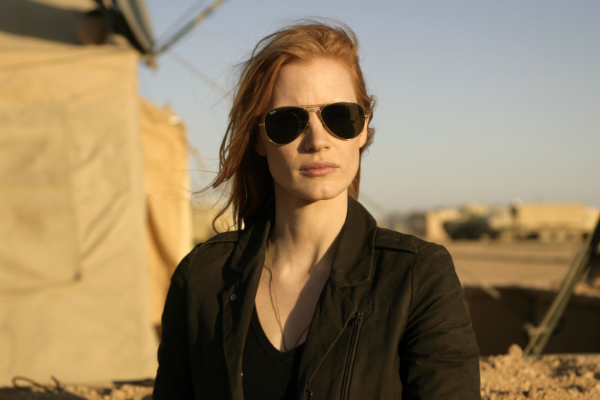
While Jennifer Lawrence was catapulting to fame as a movie star in the early 2010s, Jessica Chastain was on a similar trajectory away from the tabloids in the film world. She had a breakout year in 2011 that ended in a Best Supporting Actress Oscar nomination for The Help, but her role as Maya in Zero Dark Thirty was her biggest yet. Playing the woman who would help capture Osama bin Laden, Chastain imbued her performance with fierce determination and a hunger for justice, while clearly showing her vulnerabilities.
Chastain won the Critics’ Choice and the Golden Globe for her performance, which established her as an early frontrunner. Lawrence pulled ahead in the end, ultimately, winning SAG and the Oscar. It’s possible that without a charismatic movie star in the mix, that Chastain could have won this Oscar. Maya is the kind of special role, with her complexity of emotions and anxious spirit, that often wins Best Actress, but the star power of Lawrence and the controversy of Zero Dark Thirty likely made enough of an impact to make her the bridesmaid.
Jennifer Lawrence – Silver Linings Playbook
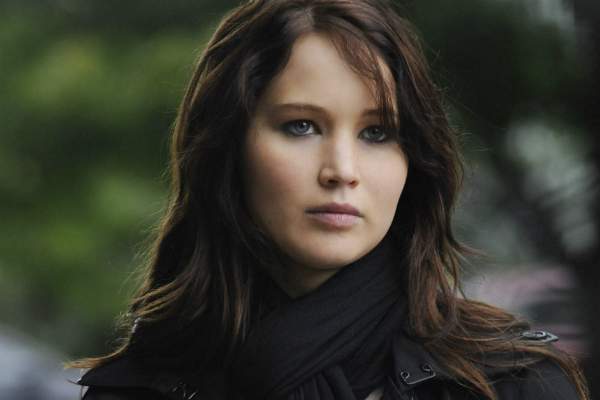
Now to the woman of the hour, Jennifer Lawrence. Silver Linings Playbook gives her the opportunity to do what she does best: be frank and confident while revealing her inner vulnerabilities. Playing Tiffany Maxwell, a young widow battling depression who turns more than a few heads for her brashness, Lawrence is right in her wheelhouse and stands tall as a strong romantic lead with Bradley Cooper.
Lawrence would go on to use those same tools on her other David O. Russell films, American Hustle and Joy. And why not? She won an Oscar for it and America fell in love with her. Yet, seeing those other performances does make the Silver Linings performance less special, and I don’t know if history will look kindly upon it. Looking back from a safe distance, can we say in a vacuum that Lawrence delivered an Oscar-winning performance that will stand the test of time? I do not quibble with her nomination at all, but I suspect that future generations who aren’t as familiar with the actress will be surprised that she actually won. Outside the bubble of celebrity and the specific narrative of 2012, her win increasingly feels up for debate.
As always this is just my opinion, but what do you think? Who deserved the 2012 Oscar for Best Actress?

